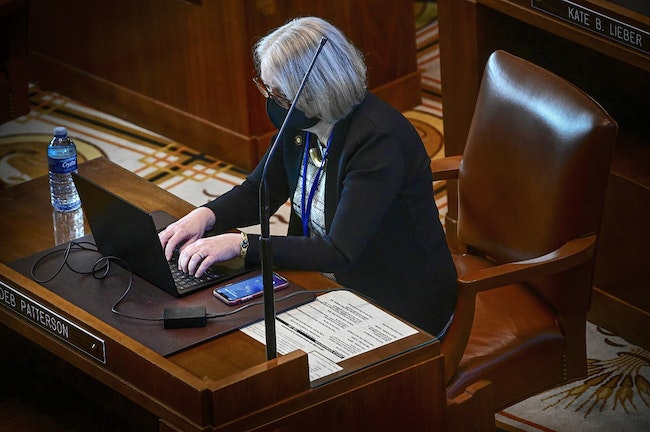 Oregon Senator Deb Patterson worked on her computer Jan. 22 following a brief session of theOregon Senate (Ron Cooper/Salem Reporter)
Oregon Senator Deb Patterson worked on her computer Jan. 22 following a brief session of theOregon Senate (Ron Cooper/Salem Reporter)
Deb Patterson in her role as a minister in early 2020 met with a parishioner who had just been diagnosed with cancer.
The woman’s doctor recommended she try a new cancer drug that had shown promising results in other patients.
But even with insurance, the drug would cost the woman $11,000 per month – well beyond her means.
The pharmaceutical company provided the medication at no charge for six months but as the end of that free supply loomed, the woman worried.
“She didn’t know how she was going to pay for that even for one more month,” Patterson said.
The struggle was fresh in Patterson’s mind when she arrived at the Oregon Legislature in January, newly elected as a state senator from south Salem.
She said the parishioner ultimately died of other causes. Her case motivated Patterson to use her new political position to tackle the affordability of health care.
Now, the legislature done, Patterson generated a record unusual for a freshman senator.
The Democrat secured passage of a key bill, SB 844, to lower prescription drug costs for Oregonians.
She did so despite heavy spending by pharmaceutical companies opposing the legislation, including full-page newspaper ads and a social media blitz.
“Big Pharma spent about a million dollars to kill that bill and it still passed,” she said.
Despite being new to office – and to politics – Patterson was named chair of the Senate Health Care Committee. From that post, she guided legislation that affects the health care of nearly every Oregonian, including requiring insurers to pay for telemedicine at the same rate as in-person care and mandating minimum staffing for nursing homes.
 Patterson in a 2020 campaign photo
Patterson in a 2020 campaign photo
Patterson narrowly won election last November in one of the most expensive legislative races in Oregon. She defeated former Sen. Denyc Boles, a Salem Republican who was appointed to the seat in 2019 following the death of longtime Sen. Jackie Winters.
Aside from an unsuccessful 2018 race against Winters, Patterson had no previous political experience and had never held elective office.
She began her career as a minister and said her advocacy on health care grew out of that work.
“So many of my parishioners had health-related issues and they often had so many medical bills that came along with it I just got concerned,” she said.
Patterson has never been a health care provider, but went back to school for a master’s degree in health care administration from Washington University School of Medicine in St. Louis.
Senate President Peter Courtney, a fellow Salem Democrat, said Patterson came to him early in the session. She requested to be placed on the Health Care Committee because of her background in advocacy for health care nonprofits.
Courtney handed her the gavel.
“I said, ‘Alright, you got it and I’m gonna make you chair,’” Courtney recalled. “I don’t micromanage chairs, so we’re going to find out how good you are pretty quick.”
Committee chairs run hearings on bills and play a significant role in deciding which bills are advanced to ultimately become law.
Most of the fine detail work of crafting public policy happens in committees, where lobbyists and citizens make their case for why a particular bill should be moved forward, tweaked or left to die on the committee floor. That happens in committee meetings, in private sessions, and through orchestrated lobbying campaigns designed to pressure legislators.
In health care, committee work is complicated. Hospitals, small clinics, doctors, pharmaceutical companies, patient advocacy groups, insurers and labor unions all want a say in legislation.
With the complexity of health care, legislators rely on lobbyists to spot potential unintended consequences of bills and often guide negotiations to see if tweaks to a bill’s language can bring more people to favor the revised legislation.
“A good committee chair is someone who has the vision, knows what they can tackle and how much they can tackle through the session – that 50,000-foot level – but also really has the ability to bring parties together, listen to all the sides, find pathways forward if there’s pathways forward,” said Courtni Dresser, director of government relations for the Oregon Medical Association. The association represents Oregon’s doctors.
Patterson succeeded Sen. Laurie Monnes Anderson, D-Gresham, a retired nurse who ran the committee since 2013.
“She’s followed a legend and that’s very, very hard,” Courtney said.
Adding to the challenge was the largely remote session – a particular struggle for lawmakers new to the job.
“Zoom is not really conducive to seeing people in the hall and having a quick word. You have to set up an appointment or pick up the phone,” Patterson said.
Patterson said running hearings and working on complex policy didn’t intimidate her. She’s served on the Marion County Health Advisory Board and spent a decade as executive director of the International Parish Nurse Resource Center, now the Westberg Institute.
But the ticking clock of a legislative session, where thousands of potential bills must be considered quickly to determine which ones to move forward, was “nerve-racking,” she said.
In her prior work, “I had the luxury of being able to consider an issue for as long as it took. In this setting, you only have till the deadlines and that’s it. You have to either move it on or it dies,” Patterson said.
Patterson said her background provided the drive and the expertise to get to work. She’s comfortable in the jargon-saturated world of health care policy, speaking with ease about health insurance reimbursement structures. When discussing those details, she’s matter-of-fact.
But her pet issues are grounded in people, often the stories of parishioners she’s heard over her years in ministry. Her voice grows more forceful when she speaks about visiting a parishoner in a nursing home that was so short-staffed Patterson was unable to find an employee to help with a medical problem for over 15 minutes.
“The person I was with wasn’t able to speak, was clearly in need of assistance was not ambulatory, so I was trying to walk around finding someone to come and help them,” she said.
Her prescription drug affordability bill was a priority for Patterson. Modeled after a similar program in Maryland, SB 844 creates a board to review the prices of prescription drugs and identify drugs where patients incur high out-of-pocket costs, or where the drug’s prices are particularly costly to the health care system.
“Some of the stories that I heard were just heartbreaking. A lady wrote in, she had to choose between her medicine or her orthotics, which made it possible for her to walk. It was a horrible choice: do I stay alive or do I walk? I mean, nobody should have to make those choices,” Patterson said.
As originally written, the new board would have had the power to limit the cost of certain drugs. Patterson said that idea garnered the most opposition, and in negotiations with legislators on the Joint Ways and Means Committee, a compromise emerged.
Now, the board would review options for bringing drug prices down and suggest to legislators policies to make that happen. The authority to set prices was stripped out of the legislation.
Patterson said she didn’t mind making changes to get the bill through.
“Perhaps upper payment limits weren’t the best way to go,” she said of her original idea.
She stayed in touch with legislators in other states throughout the session who were considering similar measures, she said.
“We just kept working until we got it to this place where we could cross the finish line,” she said.
There were still disagreements among legislators and the bill passed largely on party-line votes.
Patterson knows it’s likely to be years before Oregonians see an impact from the law as the board gets set up and begins delivering recommendations.
“I’m not on any medications and it’s not costing me or anybody in my family, but I know the stories of others,” she said. “I’ve heard patient stories. There’s no, no way I was going to let go of this.”
Courtney said Patterson’s effectiveness stemmed from understanding how lawmaking works.
“She was willing to tinker with things a bit to get them through,” Courtney said.
He said she proved particularly effective at listening to others – a skill he speculated might come from her years in ministry.
“She didn’t come in thinking that she knew it all and that her ideas were the best. You don’t always see that now in legislators in their first term,” he said.
Patterson said other key accomplishments of the session include wildfire relief, something Democrats and Republicans were able to work together on.
The demands of the session, where lawmakers fielded constituent concerns about unemployment payments and Covid relief while whittling through bills, were intense.
“I was going there prepared to work and to work hard but I saw that every legislator works extremely hard, as does their staff,” she said. “I’m just in awe of my colleagues on both sides of the aisle, how hard they worked.”
Dresser worked with Patterson on a priority bill for the medical association establishing equal payment for telehealth services. She said Patterson’s interest in the details of policy and willingness to understand all perspectives was clear.
“I can’t off the top of my head think of when a freshman’s got a role like that, but she stepped in and stepped up,” Dresser said. “She showed great patience in a very, very difficult time and that is not easy to do for anybody, especially a freshman legislator.”
Courtney said fellow legislators are waiting to see what Patterson will do during her second session.
“She was noticed right away. She’s created very high expectations for herself,” Courtney said.
Contact reporter Rachel Alexander: [email protected] or 503-575-1241.
JUST THE FACTS, FOR SALEM – We report on your community with care and depth, fairness and accuracy. Get local news that matters to you. Subscribe to Salem Reporter starting at $5 a month. Click I want to subscribe!

Rachel Alexander is Salem Reporter’s managing editor. She joined Salem Reporter when it was founded in 2018 and covers city news, education, nonprofits and a little bit of everything else. She’s been a journalist in Oregon and Washington for a decade. Outside of work, she’s a skater and board member with Salem’s Cherry City Roller Derby and can often be found with her nose buried in a book.









